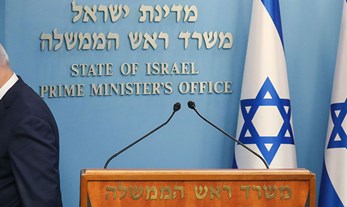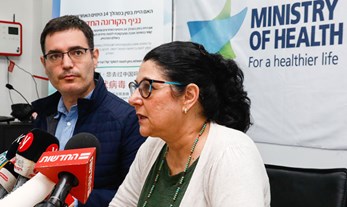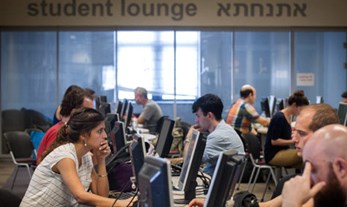


Coronavirus and Unemployment in Israel
Written By: Daphna Aviram-Nitzan
Daphna Aviram Nitzan presents an analysis of unemployment in Israel in the wake of the coronavirus pandemic.

The Impact of the Corona Crisis on the Ultra-Orthodox Community
Written By: Prof. Tamar Hermann, Dr. Or Anabi
The corona crisis has had serious economic repercussions for many households, including for members of Israel's ultra-Orthodox community. Survey findings indicate that while most of the ultra-Orthodox plan to cut back on their current expenditures, there are also quite a few households in which one of the spouses plans on increasing the scope of his or her employment, and in about one-fifth of the households- one of the spouses who has not previously worked, intends to now join the workforce.

Protecting our Privacy: Alternatives to ISA Tracking
Written By: Dr. Tehilla Shwartz Altshuler
ISA's tracking of civilians is being discussed in the Knesset Subcommittee for Secret Services. As Israel is beginning to emerge from a state of emergency, less invasive alternatives should be adopted.

The Rotation Agreement — One State, Two Governments
Written By: Dr. Assaf Shapira
The rotation mechanism agreed upon creates a governmental structure, unprecedented neither in Israel or anywhere else

PM Under Indictment - A Dangerous Precedent
Allowing Netanyahu to form a government would constitute a conflict of interest and would result in a negative and irreversible precedent for the rule of law

Most Israelis Trust Government Health Officials on Corona
IDI Coronavirus Survey finds that nearly half the population is pessimistic about Israel’s economic prospects

Decade-Long High in Israelis' 'Sense of Belonging'
Special IDI Independence Day survey 92.5% of Jewish-Israelis and 77% of Arab-Israelis feel a part of Israel and its problems.

The Alternative Government
Written By: Dr. Amir Fuchs, Dr. Assaf Shapira
IDI researchers testified before the Knesset's Special Committee: Personal and retroactive changes should not be made to legislation regarding the Prime Minister's legal status

Fighting the Coronavirus is Impacting Our Privacy
Written By: Dr. Tehilla Shwartz Altshuler
Information is power. Governments and private entities that have access to vast troves of information have vast power.

Two Hedgehogs and a Hydra
Written By: Prof. Yedidia Z. Stern
This is a familiar plague: rewriting the game rules of democracy to suit changing political circumstances has become the norm in Israel.

Will the Coronavirus Defeat the Populism Epidemic?
Written By: Dr. Dana Blander
The coronavirus is an international threat but will it stem the growth of populism around the world?

Coalition Agreement – What to Expect Moving Forward
Written By: Yohanan Plesner
IDI President Yohanan Plesner held an online media briefing and Q&A session on the new coalition agreement between the Likud and Blue and White parties.

Coronavirus and Haredi and Arab Communities
Written By: Yair Sheleg
In recent years, many comparisons have been made between two communities in Israel - the ultra-Orthodox and Arab Israelis. The coronavirus crisis has brought previously held assumptions into question.

Public Health and the Ultra-Orthodox Community in Israel
Written By: Dr. Ariel Finkelstein
The lack of exposure to mainstream media outlets and the internet limits this community's access to Health Ministry instructions on the coronavirus.

The Yom Kippur of the Ultra-Orthodox
Written By: Prof. Yedidia Z. Stern
The tragic results of initial faulty advice from leading rabbis is a wake-up call to Haredi Jews to start making their own decisions.

A Moment of Reckoning for the Education System
Written By: Dr. Tammy Hoffman
Israel is not adequately preparing its younger generation to be responsible citizens and must work now to improve its civics education curriculum.

Privacy Doesn’t Have to Die
Written By: Dr. Rachel Aridor-Hershkovitz
Privacy doesn't have to be sacrificed in order to protect citizens from the coronavirus - it too must be protected

“Jewish” Versus “Democratic”
Written By: Yair Sheleg
The cause for the past year's political crisis lie in the ever-widening gap between the two main pillars of the State of Israel’s identity—its “Jewish” and “democratic” components.

Zoom's Scandalous Privacy Policy
IDI Expert Dr. Tehilla Shwartz Altshuler: "Now is the time for the appropriate regulatory authorities to act and protect the privacy of Zoom's users."

Ultra-Orthodox Society in Israel and the Coronavirus Pandemic
Written By: Dr. Gilad Malach
Dr. Gilad Malach held a press briefing focused on the coronavirus’ effect on the ultra-Orthodox in Israel and what might be the long term implications for employment, use of technology and the attitude towards official state authorities in this often isolated community.

Israel's Democracy in the Time of Corona
Written By: Yohanan Plesner , Prof. Yuval Shany, Prof. Karnit Flug
IDI's management convened an online 'town hall' with Yohanan Plesner, Yuval Shany, Karnit Flug and Jesse Ferris to discuss the political, constitutional and economic fallout from the corona crisis, and IDI’s unique role in addressing it.

The Coronavirus: Israel's Economy and Economic Policy
Written By: Prof. Karnit Flug
Prof. Karnit Flug's press briefing today focued on the Coronavirus’ effect on the Israeli economy and policies that could mitigate the damage inflicted by the pandemic.

Court Systems Worldwide During the Coronavirus
Written By: Dr. Guy Lurie
Israel is not the only country in which the court system has been curtailed, or had its activity modified, as a result of the coronavirus pandemic. Many countries are taking such measures, while at the same time striving to refrain from harming citizen's basic right of available access to courts.
Included are several examples from around the world.

Curbing the Coronavirus Among the Ultra-Orthodox: Explainer
Written By: Dr. Gilad Malach, Leehe Friedman
How can we curb the spread of the coronavirus in the ultra-Orthodox community in Israel? IDI experts explain

76% of Israelis are Afraid of Getting Coronavirus
Written By: Prof. Tamar Hermann, Dr. Or Anabi
The Israeli Voice Index for March 2020 found that 76% of Israelis are concerned that they or a family member will contract the coronavirus – up from 34% in February.

Coronavirus Special Survey
Special Coronavirus survey by the Israel Democracy Institute takes the Israeli pulse on the impact of the Coronavirus finds that 40% of Israelis feel they are experiencing high levels of stress and 65% are worried about their financial future.

A Jumbo-Size Government? Now? Really?
Written By: Prof. Ofer Kenig
Reports of a 30 to 34 minister cabinet in the works beg for a public outcry: Costly, inefficient and divisive is not what we need today.

Limit the Number of Ministers and Deputies
In light of the Movement Towards a National Emergency Government: 30 Ministers Would be Excessive in Comparison to other Parliamentary Democracies; The cap on the number of ministers and their deputy minister should remain in place.

Prime Minister Netanyahu - 11 Consecutive Years
Written By: Prof. Ofer Kenig

What Should we be Studying in Times of Corona?
Written By: Dr. Tammy Hoffman
We should take advantage of the opportunity that the coronavirus presents to improve our children's education.

